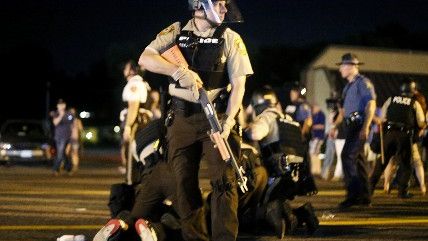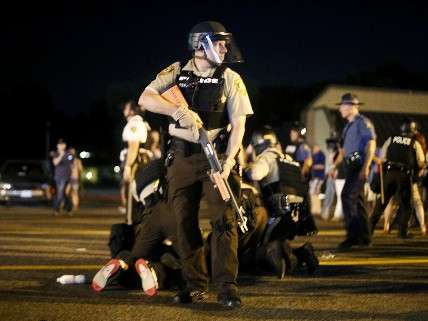Ferguson Protesters Who Challenged Law Prohibiting 'Interfering With Police' Lose in Court
Circuit court judge rules St. Louis County ordinance to be "not unconstitutionally vague or overbroad."


A lawsuit—which could have changed the dynamics of protest in the state of Missouri—failed to convince a circuit court judge that a St. Louis County ordinance banning "any person to interfere in any manner with a police officer or other employee of the County" was unconstitutional.
During one of the protests which followed the 2014 police shooting of Michael Brown by Ferguson Police Officer Darren Wilson, Melissa V. Bennett and Rebecca "KB" L. Frazier were arrested and later charged with violating the aforementioned ordinance. The St. Louis Post Dispatch reports:
The plaintiffs had argued the ordinance was more like a law that the U.S. Supreme Court struck down three decades ago, in Houston v. Hill, which barred interruption of a police officer in his duties "in any manner." In that case, the plaintiff had been arrested after shouting at police who had stopped to talk to his friend. The court found that the law as written gave police broad power to arrest virtually anyone who annoyed them.
Also according to the Post-Dispatch, the citations received by Bennett and Frazier accused them of "walking and standing in the roadway after being warned not to do so by the police officer." Though the charges were dropped, the two women based their lawsuit on the premise that the ordinance was being used by police as "a catchall to ban many activities that are protected under the First Amendment."
This argument did not convince Judge Gloria Clark Reno, who in her ruling wrote:
In the present case, the Ordinance does not proscribe free speech. A person who interferes or obstructs a police officer is not disseminating information. Prohibition of interference and obstruction of a police officer does not abridge constitutional liberty, because such activity bears no necessary relationship to protest.
Judge Reno thus upheld the ordinance's constitutionality by rejecting the plaintiff's claims that the county ordinance was "vague" or "overbroad."
Watch one of Reason TV's great dispatches from the unrest in Ferguson circa 2014 below:
Editor's Note: As of February 29, 2024, commenting privileges on reason.com posts are limited to Reason Plus subscribers. Past commenters are grandfathered in for a temporary period. Subscribe here to preserve your ability to comment. Your Reason Plus subscription also gives you an ad-free version of reason.com, along with full access to the digital edition and archives of Reason magazine. We request that comments be civil and on-topic. We do not moderate or assume any responsibility for comments, which are owned by the readers who post them. Comments do not represent the views of reason.com or Reason Foundation. We reserve the right to delete any comment and ban commenters for any reason at any time. Comments may only be edited within 5 minutes of posting. Report abuses.
Please to post comments


In the present case, the Ordinance does not proscribe free speech. A person who interferes or obstructs a police officer is not disseminating information.
Too bad the First Amendment didn't include things other than just speech.
As the article says, they apparently based their challenge on the 1A-protected activities that might be caught within the law.
Should governments even try to solve problems? There's your government of the government, by the government, for the government. Your duty is to obey and stay the hell out of their way.
Hmm, this is disturbing. In wondering why, though this law was passed. Can't police pretty much everywhere slap cuffs on you claiming exactly that?
On the one hand, the law does make me nervous. On the other, there was a time when it was generally understood that 'Civil Disobedience' as a tactic included the strong probability of arrest and jail time.
"In the present case, the Ordinance does not proscribe free speech. A person who interferes or obstructs a police officer is not disseminating information. Prohibition of interference and obstruction of a police officer does not abridge constitutional liberty, because such activity bears no necessary relationship to protest."
Is this what passes as legal reasoning in Missouri? It's entirely circular. There are more than a few cops who think that people doing things like taking pictures of them are "interfering" or "obstructing."
HR Management Software System
Magento Development Companies
ECM Software System
IoT Companies
Mobile App Development Companies
Digital Marketing Agencies
SharePoint Consulting Companies
Cloud Consulting Companies
iPhone App Development Companies
Business Intelligence Tools
WordPress Development Companies
eCommerce Development Companies
Social Media Analytics Tools
DevOps Consulting Companies
Artificial Intelligence & Machine Learning Companies